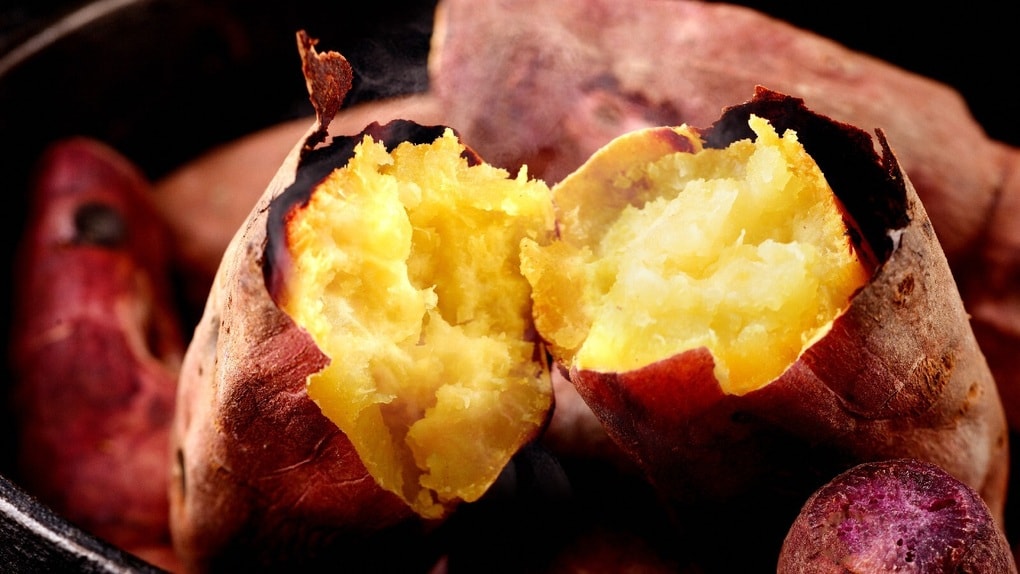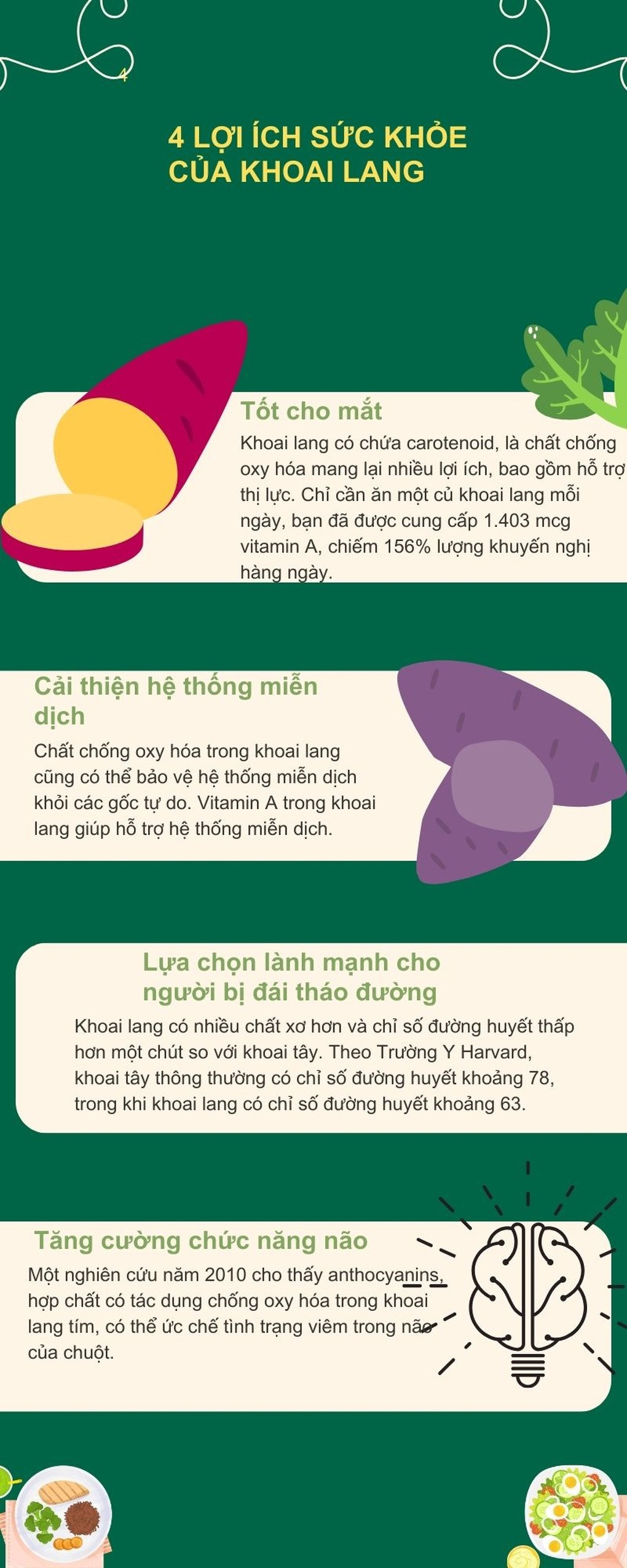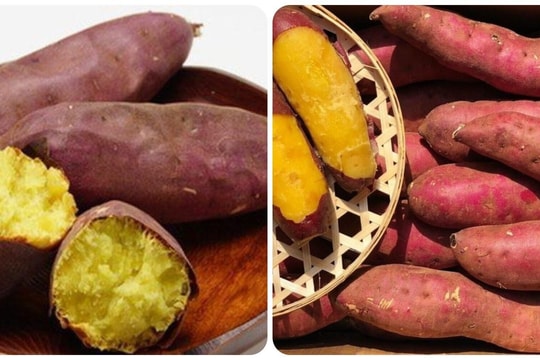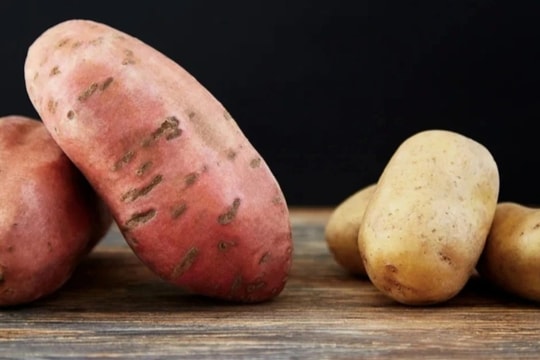Eating sweet potatoes need to know this to avoid harm
Sweet potatoes are super nutritious, have many health benefits, and even aid in weight loss. However, they also have some risks that you should know to avoid.
Nutritional value and benefitshealthof sweet potatoes
Sweet potatoes contain many nutrients necessary for the body. Every 500g of sweet potatoes contains about 635 kcal, 11.5g of protein, 14.5g of sugar, 1g of lipid, 100mg of phosphorus, 90mg of calcium, 2g of iron, 0.5mg of beta-carotene. In addition, it also contains vitamins B1, B2, C and PP, linolenic acid.
The vitamin B1 and B2 content is 3 times and 6 times higher than rice, respectively. In particular, sweet potatoes contain a lot of lysine, which is a substance that staple foods such as rice and wheat flour are often lacking.
Doctor CKII Huynh Tan Vu, University of Medicine and Pharmacy Hospital, Ho Chi Minh City, Campus 3, said that sweet potatoes contain a lot of mucin and polysaccharide, which help ensure the elasticity of blood vessels, prevent atherosclerosis, and ensure "lubrication" of the respiratory tract, digestive tract, and joints.

In addition, sweet potatoes contain a type of fiber that absorbs a lot of water in the intestines, which is helpful in preventing constipation and reducing the risk of colon cancer.
According to experts, sweet potatoes are not only rich in nutrients but also have the effect of preventing health decline, beautifying and fighting cancer. In food, nutrients that have anti-cancer effects are beta-carotene, vitamin C and folic acid, these nutrients are all high in sweet potatoes.
One sweet potato (about 100g) can provide twice the amount of vitamin A the body needs daily, 1/3 of the amount of vitamin C the body needs daily and 50mg of folic acid, in which the fiber content is as high as a bowl of oatmeal.
Sweet potatoes are high in fiber, which helps promote intestinal motility, prevent constipation and colon and rectal cancer. They also contain potassium, beta-carotene, folic acid, vitamin C and vitamin B6, which help prevent cardiovascular disease.
Besides, according to Dr. Vu, sweet potatoes contain very low calories, much lower than rice, so after eating it will not cause obesity, on the contrary, it has the effect of reducing obesity. Sweet potatoes also contain a substance similar to estrogen, which has a certain effect on skin maintenance and delaying aging.
Risks and side effects of eating sweet potatoes
Dr. Phung Tuan Giang, President of the Vietnam Institute for Research and Development of Traditional Medicine, said that people with a history of calcium-oxalate kidney stones should limit their intake of sweet potatoes. Sweet potatoes have a high oxalate content, which can combine with calcium and lead to the development of kidney stones.
If you have diabetes, remember to eat sweet potatoes in moderation. Although sweet potatoes have many health benefits, they also contain carbohydrates that can raise blood sugar levels when eaten in excess.
Sweet potatoes have a glycemic index (GI) of 54 and are considered high in carbohydrates, so people with type 2 diabetes should monitor their intake.
You can combine sweet potatoes with some non-starchy vegetables and a rich source of protein to create a nutritious meal that stabilizes blood sugar levels to enjoy. At the same time, prioritize simple cooking methods (boiling, steaming).
Similarly, according toEatingwellSweet potatoes are high in oxalates, so the National Kidney Foundation notes that they may increase the risk of developing calcium-oxalate kidney stones, the most common type of kidney stone.
You can help reduce your risk of developing this type of kidney stone by combining sweet potatoes with calcium-rich foods like cheese or yogurt. This helps the calcium and oxalate bind together in your digestive system rather than in your kidneys. As a result, it prevents the development of kidney stones.
According toLivestrongOxalate is a natural substance found in many foods, including fruits and vegetables. These foods are nutrient-dense and healthy, containing vitamins, minerals, and fiber.
According to a 2015 report in the Journal of Clinical Nutrition Research, high-oxalate foods are safe for people with diabetes, high blood pressure, and high cholesterol. However, for people with kidney stones, a lower-oxalate diet is recommended.
Oxalates normally bind with calcium during digestion and are excreted in your stool. If oxalates do not bind with calcium in the stomach or intestines, they move as waste to the kidneys and leave the body in urine.
However, if there is too much oxalate and not enough fluid in the urine, calcium-oxalate fragments form. These fragments can stick together and form a larger crystal called a kidney stone.
Therefore, you can reduce your risk of developing kidney stones by drinking plenty of water and eating calcium- and oxalate-rich foods together at meals. This will help ensure that the oxalate and calcium bind together in the stomach before being processed by the kidneys, making stones less likely to form.
Additionally, overconsumption can turn your skin orange. One of the biggest benefits of sweet potatoes is their vitamin A content. However, overconsumption can cause your skin to turn orange-yellow. This is a harmless condition called carotenodermia, and you can reverse it by avoiding foods rich in vitamin A for a while.


.jpeg)




